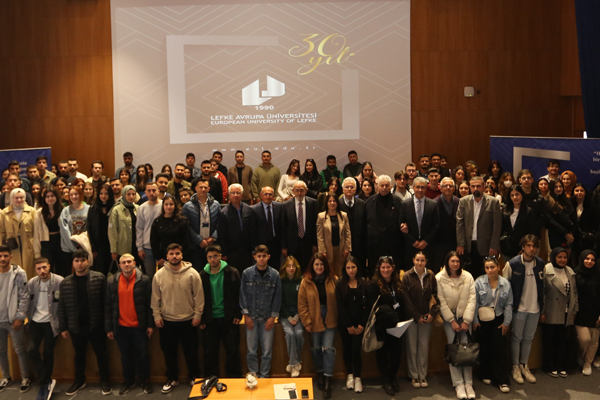A panel titled “The Legend of Çanakkale: Çanakkale is the Preface of New Türkiye” was organised at EUL

European University of Lefke (EUL) organised a panel titled “The Legend of Çanakkale: Çanakkale is the Preface of New Türkiye” in collaboration with Dr. Fazıl Küçük Faculty of Education, commemorating the 109th anniversary of the Çanakkale Victory.
The opening speech of the panel, which started with a moment of silence and the singing of the National Anthem on behalf of the Great Leader Mustafa Kemal Atatürk and all our martyrs, was made by Prof. Dr. Nergüz Bulut Serin, Dean of Dr. Fazıl Küçük Faculty of Education. Serin stated, “On 18 March 1915, as a result of the struggle of thousands of sons of the motherland, especially Mustafa Kemal Atatürk, with determination, courage, and sacrifice, the 18 March Çanakkale Victory, which is an epic written in golden letters in the history of the Turkish nation, has been a turning point in the Turkish nation’s struggle for independence and freedom. In this context, as our poet Fazıl Hüsnü Dağlarca stated, “Çanakkale is the foreword of the modern Republic of Türkiye.” This is the theme of our panel,” and thanked the panellists and participants.
Prof. Dr. Saadettin Yıldız and Assoc. Prof. Dr. İhsan Tayhani contributed to the panel, which was moderated by Prof. Dr. Oğuz Karakartal.
In the speech titled “An Overview of the Çanakkale Victory on the One Hundred and Nineteenth Anniversary”, Tayhani, after emphasising that except for one or two countries of the west, such as France, none of the countries of the east had a victorious “Çanakkale”, firstly, created a historical background by making explanations about the reasons for the outbreak of the First World War, its development, and the process of the Ottoman entry into the war, and drew attention to the imperialism’s interest division in the Ottoman geography. Tayhani then touched upon the chronological stages of the March 18th Naval Battle, and he pointed out that the Commander of the Fortified Position was Cevat Pasha (Çobanlı), Capt. Nazmi, Capt. Hakkı, Seyit Corporal from Balıkesir Havran, and Yahya Çavuş from Ezineli.
Tayhani then provided chronological information about the land battles that started on April 25, 1915, and continued until 8-9 January, 1916, and after emphasising the role played by Lieutenant Colonel Mustafa Kemal in changing the fate of the Çanakkale front with three critical military strategic interventions during the land battles, he explained in detail that the aforementioned interventions took place during the battles of Arıburnu, Anafartalar, and Kireçtepe, where bloody, trench and bayonet attacks took place. He stated that it was Lieutenant Colonel Mustafa Kemal (colonel as of June 1, 1915) who made Çanakkale impassable on land and that it should be understood that Çanakkale cannot be written without Mustafa Kemal.
Yıldız, on the other hand, focused on the extent to which the Çanakkale Wars were reflected in Turkish literature. Stating that Turkish history has been shaped as “the history of war” for centuries and that we have not had the opportunity to write war literature because of fighting, Yıldız said that this situation was also valid for the Çanakkale Wars. Yıldız argued that folk dances and the works written by those sent to the Çanakkale front for observation trips formed the basis of Mehmet Akif’s poem known as “To the Martyrs of Çanakkale”. He added that the fact that the work on writing novels about the Çanakkale wars, which started in 1989, gained momentum after 2000, is promising for the “historical novel” that deals with this period.
